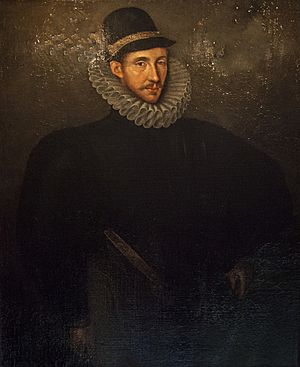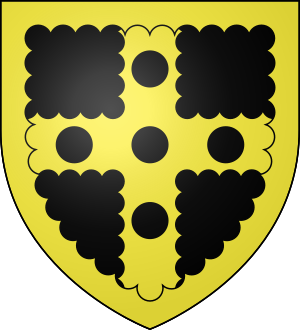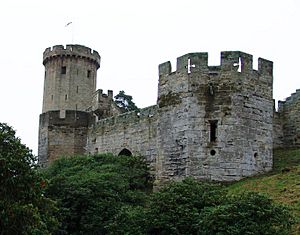Fulke Greville, 1st Baron Brooke facts for kids
Quick facts for kids
The Lord Brooke
|
|
|---|---|

Portrait by Edmund Lodge
|
|
| Chancellor of the Exchequer | |
| In office 1614–1621 |
|
| Preceded by | Sir Julius Caesar |
| Succeeded by | Sir Richard Weston |
| Personal details | |
| Born | 3 October 1554 Beauchamp's Court, Alcester |
| Died | 30 September 1628 (age 73) Brook House, Holborn, London |
| Resting place | St Mary's Church, Warwick |
| Parents |
|
| Alma mater | Shrewsbury School, Jesus College, Cambridge |
Fulke Greville, also known as Sir Fulke Greville before 1621, was an important figure in England during the time of Queen Elizabeth I and King James I. Born on October 3, 1554, he was a talented poet, dramatist (playwright), and politician. He served in the House of Commons, which is like a part of today's Parliament.
Greville was a skilled administrator. He worked for the English Crown in several important roles. These included treasurer of the navy and Chancellor of the Exchequer, which manages the country's money. For his hard work, he was given the title Baron Brooke in 1621. He also received Warwick Castle in 1604 and spent a lot of money making it better. Today, he is best known for writing about his friend, Sir Philip Sidney, and for his thoughtful poetry.
Contents
Fulke Greville: A Life of Service and Poetry
Early Life and Education
Fulke Greville was born on October 3, 1554, at Beauchamp Court in Alcester, Warwickshire. He was the only son of Sir Fulke Greville and Anne Neville.
In 1564, he started school at Shrewsbury School on the very same day as his close friend, Philip Sidney. Later, in 1568, he went to Jesus College, Cambridge to continue his studies.
Serving Queen Elizabeth I
In 1576, Greville got a job connected to the court of the Welsh Marches. This was thanks to Sir Henry Sidney, Philip's father. However, Greville left this job in 1577 to join Queen Elizabeth I's court with Philip Sidney.
The Queen liked Greville very much. She valued his serious nature and his skills in managing things. In 1581, he became a Member of Parliament for Southampton. In 1583, Queen Elizabeth made him secretary to the principality of Wales. However, he sometimes fell out of favor with the Queen. This happened when he left the country without her permission.
In 1581, Greville took part in a special event at Whitehall. This event honored French ambassadors. Greville, Philip Sidney, and two other noblemen put on a show. They called themselves the "Four Foster Children of Desire." Their show was meant to suggest that Queen Elizabeth was impossible to win over. This idea was popular among those who did not want her to marry a French prince.
Friendship with Philip Sidney
Greville, Philip Sidney, and Sir Edward Dyer were part of a group called the "Areopagus." This was a literary group that wanted to bring classical poetry styles into English writing.
In 1585, Sidney and Greville planned to go on an expedition with Sir Francis Drake. They wanted to sail against the Spanish in the West Indies. But Queen Elizabeth would not let them go. She also stopped Greville from joining Robert Dudley's army in the Netherlands. Sadly, Philip Sidney, who did join the campaign, was killed in 1586. Greville wrote a book called A Dedication to Sir Philip Sidney to remember his dear friend.
Greville fought in the Battle of Coutras in 1587. Around 1591, he also served for a short time in Normandy. He fought under King Henry III of Navarre during the French Wars of Religion. This was his last experience in war.
Life Under King James I
Greville continued to serve in Parliament, representing Warwickshire several times. In 1598, he became the Treasurer of the Navy. He kept this important job even after King James I came to power.
In 1604, King James I gave Greville Warwick Castle. The castle was in bad shape when he got it. Greville spent a large sum of money, about £20,000, to fix it up. This was a huge amount of money back then!
In 1614, he became the Chancellor of the Exchequer. This role made him responsible for the country's finances. He was a strong supporter of King James I. In 1621, he was given the title of Baron Brooke. This was a special honor that made him a peer of the realm.
His Final Years and Legacy
In 1628, Greville was attacked at his home in Holborn, London. A servant named Ralph Haywood stabbed him. Haywood believed Greville had cheated him out of his will. Haywood then harmed himself. Greville's doctors tried to treat his wounds, but he died four weeks later from infection.
His body was taken back to Warwick. He was buried in the Collegiate Church of St Mary, Warwick. On his tomb, he had written his own epitaph:
Servant to Queene Elizabeth
Conceller to King James
and Frend to Sir Philip Sidney.
Many streets in the Hatton Garden area of London are named after Greville. In 2018, the first festival dedicated to Fulke Greville was held in his hometown of Alcester.
Fulke Greville's Writings
Greville is most famous for his biography of Philip Sidney. He wrote it around 1610-1612. It was first called A Dedication to Sir Philip Sidney. It was published in 1652 as The Life of the Renowned Sir Philip Sidney. This book also includes some of Greville's own life story and thoughts on government.
Greville's poetry includes plays meant to be read, not performed (called closet tragedies), and sonnets. He also wrote poems about politics and moral ideas. His writing style is serious and full of wise sayings.
Famous Works
Here are some of Fulke Greville's main works:
- Biography
- A Dedication to Sir Philip Sidney
- Plays (Closet Drama)
- Alaham
- Mustapha
- Poems
- Caelica (a collection of 109 sonnets)
- Of Monarchy
- A Treatise of Religion
- A Treatie of Humane Learning
- An Inquisition upon Fame and Honour
- A Treatie of Warres
- Other Writings
- A letter to an "Honourable Lady"
- A letter to Grevill Varney in France
- A short speech for Francis Bacon
See also
- Canons of Elizabethan poetry
- List of owners of Warwick Castle
Categories
 | Stephanie Wilson |
 | Charles Bolden |
 | Ronald McNair |
 | Frederick D. Gregory |



